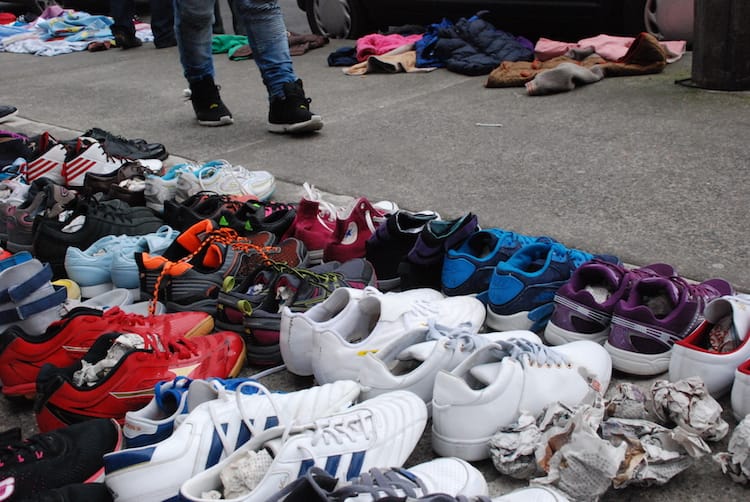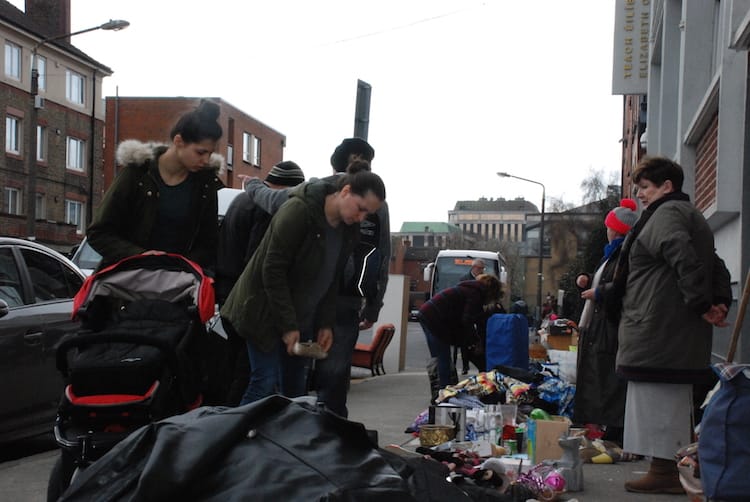What’s the best way to tell area residents about plans for a new asylum shelter nearby?
The government should tell communities directly about plans for new asylum shelters, some activists and politicians say.
“They’re made for dancing,” says Tessie Carroll, pointing to the high heels the woman inspects before leaving empty-handed. “Jaysus, if you brought gold here they’d want silver.”

“Good mornin’ and good luck to ye!” shouts Tessie Carroll at a man cycling down Cumberland Street, his bike wheels wobbling in surprise.
She is stood by the railings of Avondale House, wrapped in a red chequered headscarf, having arrived to “the Hill” at 6am, more than an hour earlier.
Dozens of shoes – “made for dancin’”, Carroll says – lie spread across the footpath for the punters visiting the Saturday morning market, now under threat of closure.
Should that happen, where’ll Carroll go after 59 years trading? “I’ll fuckin’ die,” she says, through croaky laughter.
“Ah now Missus, have a heart,” Carroll says, bartering over a pair of high heels with a customer. Across the road, more traders settle in for the day, shortly after 7:30am as sun shines down.
Carroll had arrived first. Sat on her “wagon wheels” – her small, green walker – she launches into her one-liners and catchphrases as soon as the regulars come, each one rapid-fire, followed by a laugh:

“Jesus, you’d give an aspirin a headache!”
“Go torment yer mother.”
“Talk about arsenic and old lace, what?”
“Up the Dubs! C’mon Ireland!” shouts Carroll.
Born in the tenements of nearby Summerhill in May 1932, Carroll eventually moved to Whitehall and then to the Hill Street Flats, where she has lived for nearly 60 years.
Or “Hill Street fuckin’ blues” as she refers to them. “When I’m going home in a taxi yer man’ll say ‘Where do you live Ma’am?’… Hill Street blues! Ah, good mornin’ and good luck!”
Each Saturday, she wakes up at 4am, gathers her wares and waits for her son Derek to drive her down to the market, a trip she’d make on foot but for a hip operation late last year.
“Alright love, take care and, listen, you mind the buses,” says Carroll, fixing a yellow cardigan to the railings of Avondale House.
Pinned alongside are sweaters, coats and T-shirts, all donated to Carroll by friends and family. “Hiya John! Hiya Boy! Up the Dubs!” shouts Carroll as another regular drives past.
Up walks a woman to Carroll’s patch, across the road from which another dozen traders banter and barter.
“They’re made for dancing,” says Carroll, pointing to the high heels the woman inspects before leaving empty-handed. “Jaysus, if you brought gold here they’d want silver.”
“Let me know next time you’re coming and I’ll bake a cake,” Carroll tells another regular, who arrives to Carroll’s spot with a euro she owes for a pair of shoes from last Saturday.
“Up the Dubs! See ye darlin’! Safe home!”
“She’s on that chair since 6am,” says her niece Anne Hanney, trading across the street from Carroll since she was a child. “And she’s been in the same spot since day one.”
“Up the Dubs! C’mon Ireland!” shouts Carroll at no one in particular. Sat on her wagon wheels, she eats a banana, one of two she brings each Saturday to keep her going until midday, when she makes the trip home to the Hill Street flats. “Up the Dubs!”
“She really is something else,” says Hanney, as Carroll whips out another catchphrase across the way. “Mind the buses!” she shouts, wrapped in her blue mac jacket.
“They’re years old, those catchphrases” says Hanney. “People can’t understand her. But she couldn’t care less about anything and sure that’s the way to go.”
For the traders of Cumberland Street Market, the future looks uncertain. Dublin City Council plans to “de-designate” casual trading on the street, which Hanney says “you could not get down” when the market was at its height.
“They’re taking the heart out of Dublin,” she says. “They’re literally taking the heart. If they take that away there’s nothing left, nothing if you take the heart out.”
Hanney barters with a customer over a coat. “Sure she’s off again,” she says.
“You’d give an aspirin a headache!” yells Carroll, her croaky laugh sounding through the street.

For the Banter
After working a spell at Grant Barnett on Henry Street, Carroll took to “the Hill” in 1959, trading each Saturday while her husband, Michael, worked for Córas Iompair Éireann (CIE). Or as Carroll calls it, “Come In Early”.
Cumberland Street fills up as Carroll points to a regular pacing up and down the pavement, inspecting the bargains.
“Look at him, he does the guard of honour every week here, and he won’t go home ’cause he doesn’t live there!” she cries, her voice almost hoarse from her non-stop speech.
Carroll’s six children, she says, were practically raised on the Hill. “Those were the best days of my life,” she says. “But we’d to put our pride in pockets.”
Most recently, Carroll’s audience grew, following a video posted by independent Councillor Christy Burke in which she recalls her days on “the Hill”.
While “it used to be fantastic here years ago”, she says, her friends from the market are mostly gone. “They all died through their own complaints.”
Her husband Michael died seven years ago. “He lives in Glasnevin now, he has a new address,” says Carroll, laughing. “I send all his post up there!”
What remains for Carroll, these days, is the craic, says her daughter Jean McCann.
“She goes down there for the banter,” says McCann. “It’s a big part of her life.”
Growing up in the Hill Street flats “there was no better woman” than her mother for taking part, playing football or dressing up in men’s clothes for community week.
At 85, Carroll’s positivity remains. “She has always been like that,” says McCann.
It was shortly before Christmas when Carroll had the hip operation, and couldn’t make it to the Hill for a spell.
“She missed it dreadfully. She was asking after everyone down there,” says McCann. “‘I suppose they’re all asking after me?’”
Each Saturday morning, Carroll insists on making the trip down to the market. Should she look out the window and see rain, she’ll point out a different window of her small flat to where it’s dry, chancing her arm, says McCann.
At times, says McCann, it can take an hour to persuade her not to go. “Sometimes she’s out in all weather,” she says.
Apart from her age, her mother’s one-liners are what marks her out from her fellow traders. “She has so many of them,” she says. “A couple of years ago we said we’d have to make a book of them.”
Her sons, daughters, nieces, nephews, grandchildren and their partners all donate bits to Carroll each week for her to sell, to make a few bob at the markets. “She’s always so grateful, too,” says McCann “She’ll send you a card. These are the things that are important to her.”
At “the Hill”, Carroll’s rapid-fire manner of speech helps keeps people on their toes, says McCann. “She jumps from one thing to another. She starts one story then jumps to another.”
As Carroll heats her second banana, a man named PJ walks down Cumberland Street towards her patch.
She’ll soon gather up her wares, load up her wagon wheels and trundle up Hill Street and home, to Hill Street blues.
“Up the Dubs! C’mon Ireland!” she cries once more, out onto the street.
“When Ireland lost that time they must have moved the goal … they must’ve moved … ah look at him … look at him … Hey! Heya PJ! Up the rebels! Up ya boyo!”
For Carroll, the end of the Cumberland Street Market might be the end of her, she remarks half-jokingly.
As she sees it, council management – “a bunch of balls … a bunch of billiard balls” – don’t understand the history and importance of “the Hill. We’ve our livelihoods, our bills to pay,” she says.
And “for every cat, dog and divil” in search of a bargain, “the Hill’s” the spot. “Come into me walk around my store,” she cries out to the street. “My store with the see-through windows.”
Get our latest headlines in one of them, and recommendations for things to do in Dublin in the other.